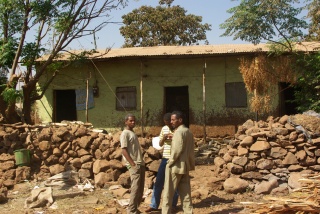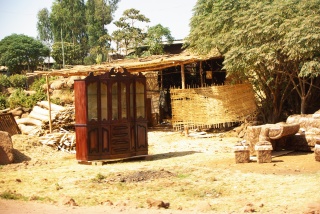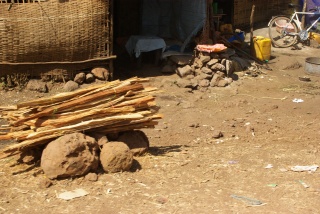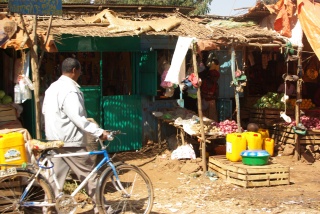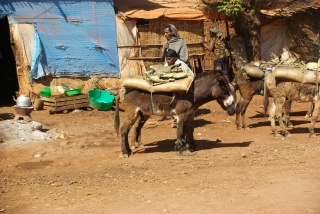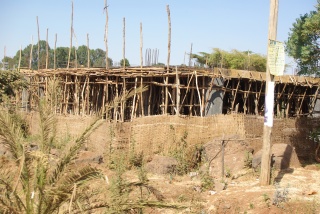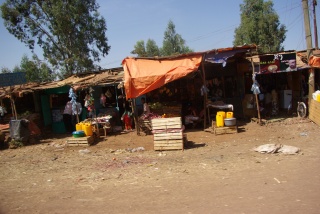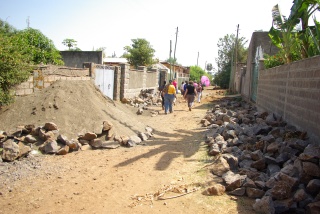I found this article on Ethiopia's Christian history and thought it worth re-publishing. I have not verified its content against other sources, but it aligns with the knowledge I already have.
Steve B
=====
Christianity in Ethiopia
Ethiopia has found strength in the church. From as far back as biblical times, the church has been the foundation upon which this magnificent country has developed.
When the flood waters receded, and Noah and his sons disembarked from the great ship, God told them to, "Be fruitful and increase in number; multiply on the earth and increase upon it" (Genesis 9:7). Each of Noah's sons and their wives set out to do just that. His eldest son Shem, whom Jesus descended from, went into what is now Jerusalem. Japheth went into Europe and Asia Minor. Noah's third son, Ham, settled in Canaan, which is now Jordan, Saudi Arabia, Egypt, and East Africa (Bible Commentary).
One of the areas that Ham's descendents settled is now present-day Ethiopia, one of the oldest countries in existence (Bible Commentary).
The first known civilization in Ethiopia was that of the mighty Aksumite Kingdom. Having established itself in 1000 BC, in northern Ethiopia, it eventually spread over all of northern and even central Ethiopia. The ancient city of Axum, which was started by the Aksumites, was Ethiopia's first capital city (Kurtz 45).
During the reign of the Aksumites, King Solomon, who was in power from 970-930 BC, was visited by the Queen of Sheba (1 Kings 10: 1-13). Different theories have been presented as to where the queen was actually from. One Ethiopian story, called the Kibra Negast, states that the queen was actually Queen Makeda (said to have reigned from 1005-955 BC in the coastal regions of Ethiopia). This story claims that when Queen Makeda went to visit King Solomon, she converted to Judaism, and they became romantically involved. She bore him a son, Menelik I, and at the age of thirteen he went back to Jerusalem to get his father's blessing. Solomon, as the story states, appointed Menelik the first king of Ethiopia (Sorenson 23).
Because of this, Judaism spread throughout Ethiopia. Falashas, or black Jews, practiced a simple form of Judaism. Because they lived in near isolation, the Falashas had only the first five books of the Bible, known as the laws of Moses (Kurtz 31).
Axum was one of the largest and greatest cities of the Roman Empire, and because Rome dominated Red Sea trading, it was only a matter of time before Christianity would reach Ethiopia's shore (Marcus 7).
According to church tradition, two Syrian boys, Aedisius and Frumentius, introduced Christianity to Ethiopia. Emperor Ella Amida put these two young men, who were shipwrecked, to work as slaves. As the years passed, they gained trust with the Emperor, and he released them from prison. After the emperor's death, his widow, who was now in power, asked them to stay and to advise her until her infant son, Ezanus, came of age. While in this capacity, Frumentius sought out Christian merchants to start up churches, which caused the spreading of the gospel throughout Ethiopia (Marcus 7).
When Ezanus took the throne in approximately 303, Frumentius went to Alexandria, and was designated as the official bishop to Ethiopia. He returned to Ethiopia in 305 and began a lifetime of evangelism, including converting Emperor Ezanus to Christianity (Marcus 7).
In 350, Ezanus expanded his kingdom into Sudan and the Nile region to secure trade. After defeating the opposition, Emperor Ezanus thanked God for his protection, and for the next few centuries, no one is known to have challenged Axum's trading monopoly (Marcus 8).
Trade not only brought prosperity, but it also brought about change. Ge'ez began to take hold as the common language of the people and was often used by royalty. The Bible was also translated into Ge'ez. As well as the language taking shape, other countries began looking to Axum as a superpower (Marcus 8).
In the 12th century a new dynasty was beginning to emerge in the highlands of Ethiopia (Spaansen 2). Although this new dynasty, known as the Zagwes, retained the Aksumite social and political protocol, their achievements had remained obscured. It was not until Emperor Lalibela issued the building of eleven rock-hewn churches during his rule of 1185-1225 that they were recognized as a new political and religious power (Marcus 12).
These eleven churches in Lalibela formed a museum of sacred architecture. In comparing these monolithic structures with other such structures in Ethiopia, it is obvious that the idea of hewing churches out of solid rock was inspired. What sets these structures apart are there amazing features, such as chiseled-out entryways, courtyards, and interiors, and the rich "geometric and linear" decorations. To achieve this awesome wonder, Emperor Lalibela recruited craftsmen from as far away as Egypt and the Holy Land (Marcus 12).
Europeans were very intrigued with Ethiopia during the Middle Ages because they believed it to be the only Christian nation outside of Europe (Kurtz 66). Legends began to circulate in twelfth-century Europe of a mysterious priest-king named Prestor John. This devout Christian ruled a kingdom strategically placed to ward off the Islamic influence (Marcus 14).
The mystery of Prestor John sparked the image of Ethiopia as an awe-inspiring kingdom and a much-desired ally (Sorensen 24). This persona, along with a kingdom that was both peaceful and united (with exotic animals and people), combined to create an image of Ethiopia that was captured in the minds of Europeans and prompted them to eagerly thirst for Ethiopian resources (Marcus 14).
The Zagwe dynasty was overthrown in 1270 by Yekuno Amlak, who claimed to be a direct descendant of Menelik I, the son of King Solomon and Makeda, Queen of Saba. This claim made it very easy for him to proclaim himself emperor and to regain the Solomonic line in Ethiopia. This story, which is also told in the Kibre Negast, glorifies this monarchial line and associates Ethiopia with the Judeo-Christian tradition (Marcus 18).
In 1436, Zara Yakob was crowned king. Since the Islamic challenge was sometimes a reality and always a threat, Zara continued to mold Christianity into Ethiopia's main line of internal defense. Even the most radical clergy were integrated into the political economy further unifying church and state. Zara Yakob fought Muslim control of shipping around the Horn of Africa, and reports of his success made their way to Europe, which only added to the mystique of Prestor John. Some European leaders exaggerated the importance of Ethiopia hoping to dissuade Muslim influence in Egypt, Arabia, and Syria. Zara Yakob was a very strong ruler and because his successors were weak, this lead to the decline of the Solomonic Monarchy (Marcus 24-27).
The explosion of Islam into this mostly Christian kingdom had been long in the making. Islam had come to Ethiopia in 615 when a group of persecuted Muslims fled to Axum. Their leader, the prophet Mohammed, said that Ethiopia was "a land of righteousness where no one was wronged." During the latter part of the seventh century, Muslims swept over Africa and the Mid East forcing many people to convert to Islam in what is known as a jihad, or a Holy War (Kurtz 46).
Though the Islamic armies had tried numerous times to defeat the Christian nation, it wasn't until 1528 that Ahmed "the left-handed" finally succeeded. By 1535, Ahmed had a kingdom that spread from the Red Sea to Ethiopia's interior. In that same year Ethiopia's Emperor Dengel sent a cry for help to Europe. Portugal responded and in 1541, after six terrible years of war, they delivered four hundred musketeers. When the Ethio-Portugese army caught up with the Muslim armies, the fighting continued for two long and agonizing years. On February 25, 1543, Ahmed was killed, and the Christians gained control of Ethiopia once more (Marcus 34). The fighting had left the country poorer, with many cattle killed and people taken away by the Muslims and sold as slaves in Arab lands (Kurtz 49).
During the 1700s the Oromo people from the south attacked and raided the plateau region of Ethiopia. Unlike the Muslims, the Oromo people did not force their own religious beliefs or culture on the Ethiopians. In 1766, civil war broke out resulting in the beginning of the "age of the princes," which lasted until 1825 (Marcus 47). This period, also known as the zamena mesafint period, was best known for its slave trade. In the zamena mesafint, each province had its own king, and people felt loyalty to their own province, not to a country called Ethiopia (Kurtz 50).
Historically, Ethiopia has found its strength in the church. From its initial foundation from King Solomon and Queen Makeda, to the rise of Islam in the seveth century, to the resurgence of Christianity in the fourteenth century, the church has been and will continue to shape Ethiopia.
source: http://fhi.net/fhius/ethiopiafamine/christian.html 






